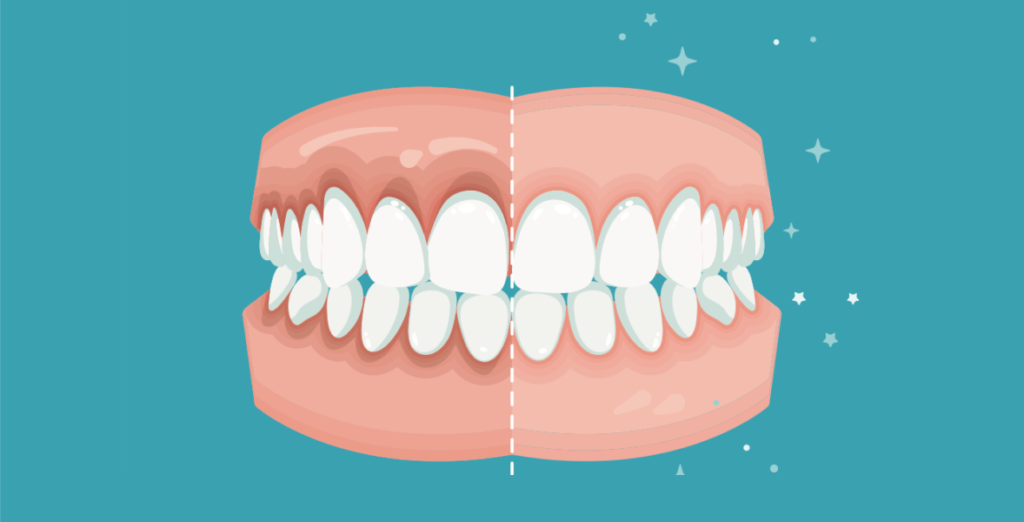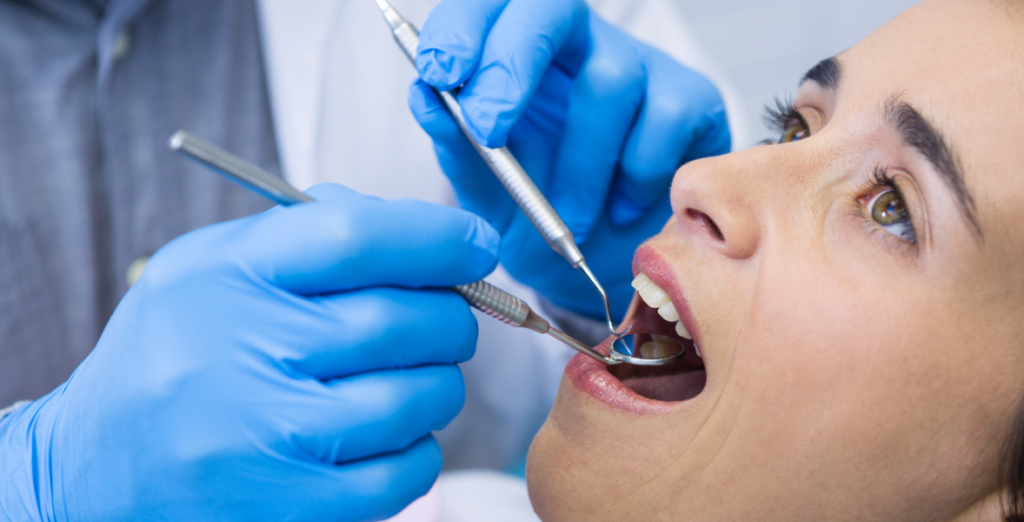This treatment is for you if…
You have gum problems, such as inflammation or bleeding.
What is periodontics?
Periodontics is the branch of odontology relating to illnesses that affect the structures of teeth support. These include the gums, the periodontium, which is the group of tissues that support the teeth, and the alveolar bone, which houses and holds the teeth in the alveolus.
Periodontal treatments are carried out to prevent or cure gum recession, the loss of bone and to prevent teeth from falling out. They also serve to eliminate dental tartar and avoid bleeding gums.
Periodontics may include the treatment of different types of illnesses, which range from minor injuries such as gingivitis to more severe diseases such as periodontitis. A periodontist will be the odontologist that treats these illnesses.
Periodontitis is a gum infection that damages tissue and destroys the bone that holds the teeth. Furthermore, it can cause the teeth to weaken, leading to their loss.

What types of periodontal treatments exist?
Periodontics is a branch that comprises diverse treatments based on the seriousness and type of illness of the patient. Periodontal treatments include:
- Non-surgical periodontal treatments.
- Surgical periodontal treatments.
- Periodontal plastic surgery treatments.
- Regenerative procedures to recover soft and hard tissue lost.
Non-surgical periodontal treatments
The most common non-surgical periodontal treatment is the perio scaling and root planing technique. It consists of a careful cleaning of the surface areas of the root to eliminate the accumulated plaque and tartar in the periodontal sacs.
When this treatment cannot be carried out on a routine basis, because the depth of the periodontal sac is excessive and makes daily oral hygiene impossible, the treatment will require a surgical reduction of the periodontal sacs, together with their cleaning.
Surgical periodontal treatments
Some periodontal treatments require surgery. These include gum recession. A gum graft repairs gum defects and prevents additional recession and bone loss. This treatment also reduces teeth sensitivity and improves aesthetics.
In some cases, the gums cover the teeth a lot. This is when surgical treatment is carried out to lengthen the dental crown, eliminating the gum excess and exposing the crown of the teeth further.
Generally, a wide variety of treatments exist to keep gums and teeth healthy, both surgical and non-surgical. However, all require the maintenance of routine oral hygiene at home and regular check-ups at the clinic to obtain the desired results.
To carry out this correct hygiene, it is recommended that you brush your teeth at least twice a day for two minutes, both morning and night, and that you use dental floss once a day. Furthermore, it is recommendable to have a scale and polish once or twice a year.
Advantages of periodontics
Despite the fact that the main benefit of most dental treatments is aesthetic improvement, periodontics is a treatment that basically reduces health problems as well as improves aesthetic issues.
The main advantages of periodontic treatments are as follows:
- Prevention of tooth loss.
- Prevention of loss of tissue and of the bone that holds the teeth.
- Elimination of accumulated tartar.
- Reduction of halitosis when it is related to bacteria from tartar.
- Reduction of tooth mobility, in turn, preventing the need for other treatments, such as orthodontics.
- Reduction of bleeding gums.
- Lengthens the duration of natural teeth and their functionality.
To obtain these benefits, as well as the correct treatment, it is necessary to keep good dental hygiene and visit the dentist regularly.

Periodontic treatment phases
On many occasions, people with illnesses that require periodontic treatment are unaware of them. This is the case of gingivitis, a reversible inflammation of gum tissue around the teeth, which is normally painless and has very light symptoms.
Gingivitis can be prevented and reversed with good oral hygiene and with the help of professionals such as odontologists and hygienists, which can eliminate the existing tartar that provokes gum irritation. Oral health habits, such as brushing, the use of floss and mouthwash can prevent the accumulation of tartar, and therefore, gingivitis.
If not treated, gingivitis can evolve into periodontitis. Therefore, healthy habits, such as regular trips to the dentist, can improve the possibilities of a successful treatment.
If the patient reaches the extreme of having periodontitis, a treatment will be performed to clean the sacs around the teeth and avoid damage to the surrounding bone. When the periodontitis is not very advanced, scantly invasive treatments are performed:
- Perio scaling and root planing. To eliminate the tartar and bacteria from the surface area of teeth and below the gums. It is carried out using manual instruments such as curettes or with an ultrasound device or laser.

When periodontitis is advanced, surgical treatment may be required. Some of these treatments are as follows:
- Flap surgery
- Soft tissue grafts
- Bone grafts
- Guided tissue regeneration
These techniques enable tartar to be more effectively eliminated and lost soft tissue (gums) and hard tissue (bones) to be replaced.
The treatment phases, however, depend on the progression of the illness. It can be prevented and reversed completely in its initial phases, without even becoming gingivitis. The more advanced the illness, the more invasive the treatment required to cure it.
Frequently asked questions
Periodontics is a branch of odontology that deals with the prevention, diagnosis and treatment of illnesses affecting the tissue supporting the teeth, such as the gums, the periodontal ligaments and the alveolar bone. It is vital to maintain good oral health, since periodontal diseases can lead to a loss of teeth and affect general health.
The symptoms may include red inflamed gums, bleeding on brushing or using dental floss, retracted gums, persistent bad breath, loose teeth and changes in bite. Early detection and treatment are crucial to prevent permanent damage.
The treatment may vary according to the seriousness of the disease. In these early stages, you can include professional cleaning and improved oral hygiene at home. In more advanced cases, it usually includes scaling and root planing, to eliminate plaque and tartar below the gum line, and even periodontal surgery.
Prevention includes adequate oral hygiene with brushing and the use of dental floss, interdental brushes or a water irrigator on a regular basis, frequent dental check-ups and scales and polishes and avoiding smoking. Having a balanced diet can also contribute to the health of your gums.
The cost of periodontics varies according to the case and its seriousness. You can consult Adeslas’s price list by clicking here.
Prices
The amounts indicated have been estimated in line with a full treatment, in accordance with the parameters in the table. Includes: study, treatment and check-ups during the treatment, so it serves as a guide and is of a merely informative non-contractual nature. The personalised treatment will be examined in line with the medical prescription. Prices can be increased if additional costs are incurred as a result of the requests made by each customer. Price valid until 31 December 2024 except in the event of a typing error.

